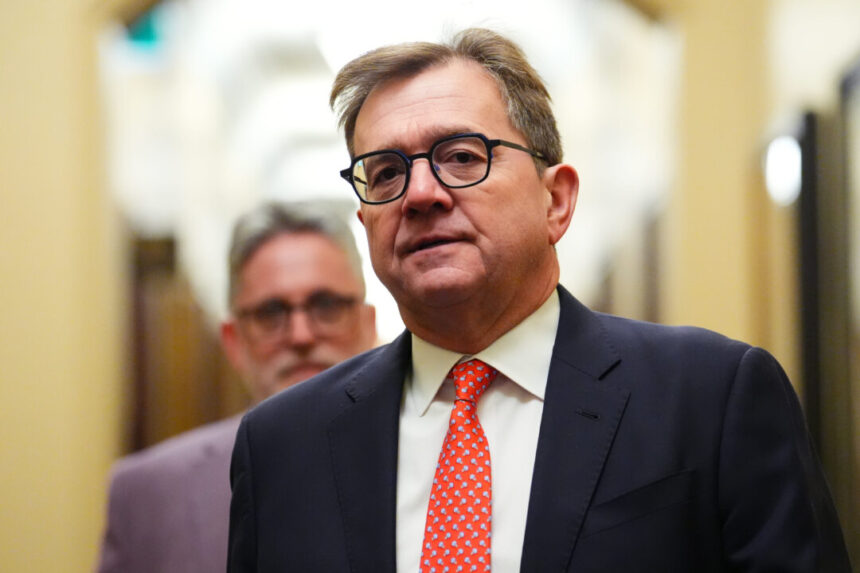Canada’s energy minister proposed a joint strategic minerals reserve to help the U.S. and Canada counter an increasingly aggressive China.
A “true energy and minerals alliance” between the United States and Canada could feature a strategic minerals reserve that ensures competitive pricing for critical minerals, in a combined effort to free the global market from China’s manipulative domination, Canada’s chief energy official said Tuesday.
“Rather than going down a path that will inevitably be lose-lose, I am suggesting something entirely different,” Canadian Minister of Energy and Natural Resources Jonathan Wilkinson said during a Feb. 4 discussion at the Atlantic Council’s Global Energy Center in Washington.
“Such an alliance would enable United States and Canada to achieve our shared vision for affordable energy bills for families, strong and secure economies, and North America as the world’s dominant energy supplier,” he said.
Wilkinson was in Washington for talks with administration officials, a day after President Donald Trump postponed levying a 25-percent tariff on Canadian imports for 30 days.
The Canadian energy chief said the neighboring nations are so economically tethered to each other that greater collaboration makes common sense, especially in the face of “the increasingly aggressive behavior of international actors like China.”
Tariffs “would cause financial pain for Canadian families, no doubt,” he said, and they would also inflict hardship on American families and businesses.
“Americans would see higher prices when filling up their gas tanks and heating their homes. Groceries would become more expensive because Canadian potash that supplies American farmers would cost farmers more,” Wilkinson said. He cited a Wells Fargo analysis that Canada tariffs would add $2,000 to car price tags and “cost an average American family about $1,300 per year.”
Wilkinson said he wanted to focus on “the enormous economic opportunities that exist for cooperation between our respective countries.”
“I firmly believe collaboration is what makes this continent great and will enable our conversation to move from one about tariffs, which, in my mind, is a lose-lose conversation, to one about prosperity and security, which offers a win-win.”
Strategic Minerals Reserve
Collaborative ventures could be particularly lucrative in energy and critical minerals development, he said.
According to the United States Geological Survey’s (USGS) 2022 List of Critical Minerals, China was the top producer of 29 of the world’s “most critical” 50 minerals. Among them are gallium, germanium, antimony, and graphite. China in December restricted exports of these and other key minerals to the United States.
Wilkinson said Canada has “significant quantities” of germanium, zinc, nickel, copper, and graphite. As an example of a mutually beneficial opportunity, he cited a longstanding joint investment germanium program between Canada and the U.S. Department of Defense. It would “displace germanium the United States has been purchasing from China,” he said.
The United States and Canada can collaborate on rare earth processing “once again reducing exposure to independence on China,” he said, noting that the one large rare earth mine that exists in the United States sends its product to China for processing because of a lack of processing technology in North America.
Because China dominates critical global markets, it can manipulate them to prevent other nations from competing, Wilkinson said.
“Whenever you are looking to start a project that requires hundreds of millions of dollars, all of a sudden the price goes down significantly, and the business case actually falls away,” he said. “We’ve seen that with lithium. We’ve seen it more recently with nickel, where China has used its dominance to flood the market.”
Wilkinson said the United States and Canada, and potentially with Australia and a few other nations, could establish a strategic minerals reserve and “create some kind of a mechanism around a price floor that will give businesses certainty so you can actually attract private capital for some of these kinds of projects.”
A Complete Nuclear Fuel Cycle
The nations can jointly develop uranium “to build a complete North American nuclear fuel cycle, which would mean relying less on Russia and enhancing continental security,” he said, noting that Canadian uranium already powers the equivalent of almost 20 million American homes.
“You need uranium from Canada,” Wilkinson said. It would be a “perfect marriage,” since Canada “doesn’t really want to do enrichment because of non-proliferation kinds of issues.“ The two countries could work together ”to ensure we actually can enable the development and the deployment of these technologies as expeditiously as possible.”
There’s also potential for negotiating how “we can enhance the flow of Canadian crude from Alberta to assist the administration’s goal of energy dominance,” and increase energy exports from the United States to the world, he said.
Joint projects include enhancing the capacity of Canada’s Enbridge pipeline, which carries western Canadian crude oil to refineries in eastern Canada and the United States, he said.
As in the United States, Canada and its provincial governments are auditing regulations to streamline permitting, Wilkinson said.
Canada’s permitting process “needs to be much shorter than it is and we are focused on that,” he said. “In the United States—and I say this with great respect—but it’s even harder to get a mine permitted than it is in Canada.”
Wilkinson said deregulation will be more of a challenge in the United States, because its 50 states individually have more regulatory authority than Canada’s 10 provinces and three territories.
Climate Concerns and Energy Security
A Liberal Party member of the Canadian Parliament’s House of Commons since 2015, Wilkinson has served in cabinet positions since 2018, including that of Environment and Climate Change Minister, before being named Minister of Energy and Natural Resources by Prime Minister Justin Trudeau in 2023.
He was on the list of potential candidates to succeed Trudeau after the Canadian prime minister resigned last month, but withdrew his name from the running.
A Rhodes Scholar, Wilkinson spent more than 20 years in the private sector, primarily with green energy companies, including Nexterra Systems, which develops “community scale gasification systems that convert non-recyclable organic waste into clean, renewable heat and power.”
He was among the primary architects of Canada’s 2020 plan to reach its then-2030 emissions targets, as outlined in its “A Healthy Environment and a Healthy Economy” plan.
Wilkinson said he “got into politics because of climate change.”
“So I am committed to the fighting against climate change. It’s a science issue. [It] shouldn’t be a partisan issue. But we need to do that in a manner that is thoughtful, that addresses concerns—legitimate concerns—people have, about affordability, and do so in a manner that actually ideally enhances our own energy security.”
Wilkinson said that while Trump’s 25-percent tariff levy on Canadian exports would necessitate a response, “it is ultimately the people of our respective countries who will pay the costs.”
Stopping the Flow of Fentanyl
A key motive behind the new tariffs on Canada, Mexico, and China is to stop the flow of fentanyl across the U.S. border. A White House factsheet on the tariffs highlighted “the growing presence of Mexican cartels operating fentanyl and nitazene synthesis labs in Canada” and Canada’s “growing footprint within international narcotics distribution.”
Wilkinson said that the scale of illegal immigration and fentanyl seizures at the U.S.–Canada border is “not particularly significant.”
Canada represents just 0.2 percent of U.S. fentanyl border seizures, he said, noting that the amount of fentanyl seized at the U.S.–Canada border is “not a lot more than the seizures that go the other way. ”
Since the inauguration, Wilkinson said, Canada has announced “an enhanced border plan” to augment the $1.3 billion border plan it announced in December, which included funding for more helicopters, drones, canine teams, and mobile surveillance towers.
The additional measures will include the appointment of a Canadian “fentanyl czar,” listing cartels as terrorist organizations, and the launch of a “U.S.-Canada joint strike force” to combat organized crime.
“I want to be very clear about this, just like the U.S., Canada has no interest in illegal crossings, either of people or of substances. One illegal crossing and one pound of fentanyl crossing the border is too much. In this regard, we agree very much with President Trump,” Wilkinson said.
Pathways for Collaboration
Canadians were caught off guard by the tariffs imposed by the United States, he said.
“When all of a sudden Canada is treated more like an adversary than a partner, it did shake every Canadian, and I think you saw that in some of the patriotic expressions that came out in the aftermath of the decision to impose tariffs,” Wilkinson said.
“We need to hopefully walk back from the brink and find pathways through which we can actually work together.”
If not, Wilkinson said, Americans and Canadians will pay more for everything and continue to be reliant on China.
Wilkinson noted large U.S. purchases of uranium and potash from Russia. “You don’t need to. If we actually work together, you can be completely secure,” he said.
“Why are so many critical minerals being purchased from China? You don’t need to, if we work together.”











